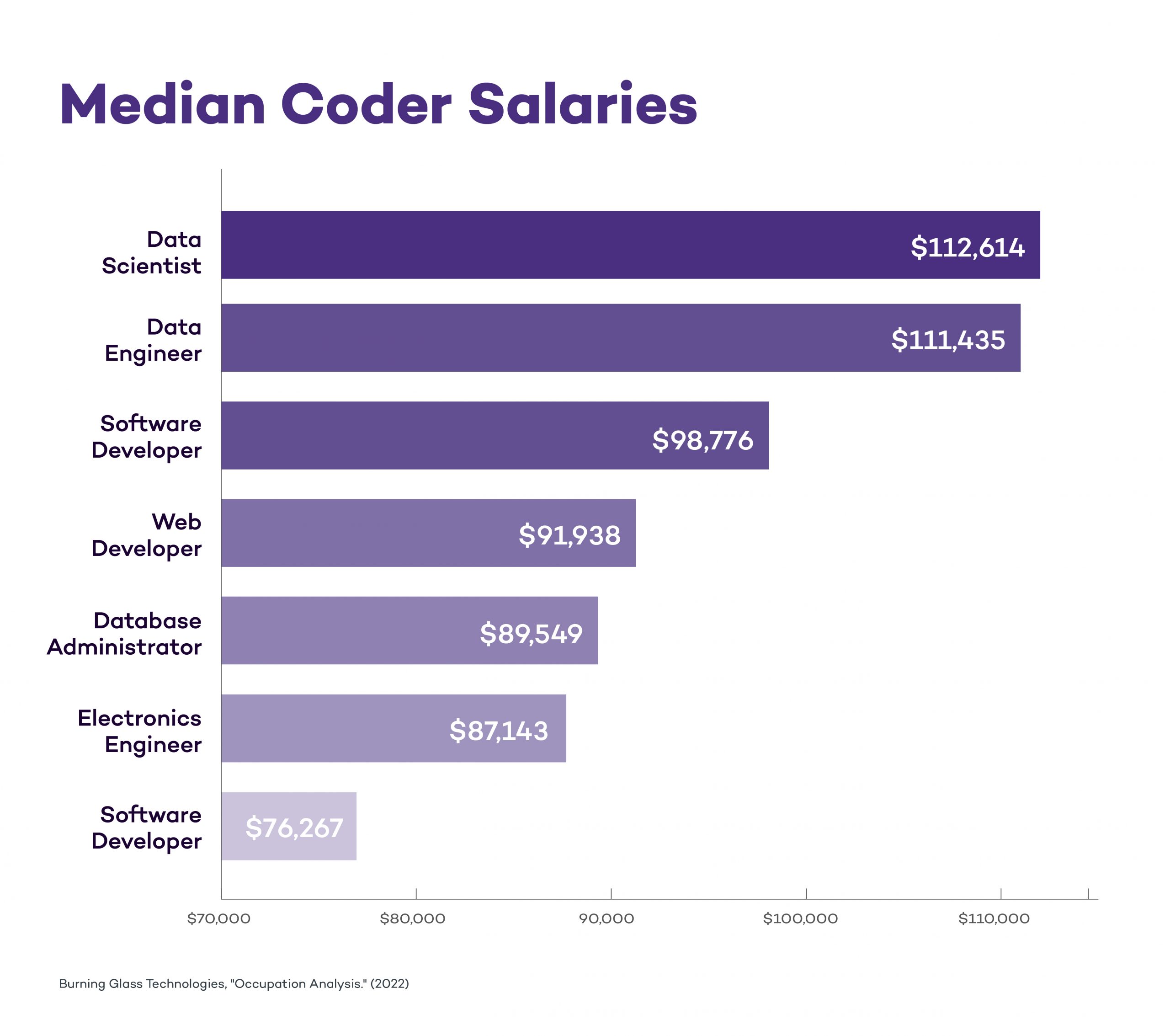Why Pursue a Coding Career?
Technology has come to play a huge role in daily life. Whether you want to book a vacation, communicate with your family, manage your money, or schedule a dinner date, you’re going to interact with at least one technical product.
As apps and websites become more advanced and more everyday tasks are digitized, demand for coders — or professionals with a coding background — continues to be significant. According to the Bureau of Labor Statistics (BLS), there were over 185,000 computer programming jobs in the United States last year, with a median salary of $89,190.
If you’re curious about how to get a coding job, keep in mind that recruiters are looking for candidates with knowledge of multiple programming languages, and as much relevant experience as possible. Enrolling in a coding boot camp can be incredibly helpful if you want to acquire these skills and experience needed to stand out from other applicants.
Coding Job Overviews
There are many different types of coding jobs, all of which require a unique combination of knowledge and skills. Below are a few common coding jobs overviews to help you direct your education and training plan based on which roles appeal most to you.
Computer Programmer
Computer programming is one of the more straightforward coding jobs. These professionals write and test the code that makes websites and software function properly.
Web Developer
Web developers are the people who build and maintain the websites you visit every day. They create the visual aesthetic of a website and decide how it will function for users. Back end web developers create the technology necessary for a website to operate, while front end web developers use code to create the design and programming that make up the user-facing aspects of a website. Full stack web developers cover both front end and back end and are most prevalent at companies that don’t have an entire team of developers.
Software Developer
Software developers build computer software and apps, and they most often focus on consumer-facing products. Therefore, they have to understand and anticipate user needs, and balance them with market demands. They are also responsible for modifying and fixing the products they create as needed.
Data Scientist
Data science is one of the more technical fields accessible to coders. These professionals extract and transform raw data into meaningful insights, and coders in these roles utilize data mining, data modeling, machine learning, and natural language processing to achieve these goals. They also visualize and interpret their key findings to inform their companies’ decisions.
UX Designer
If you’ve got an eye for design, you may want to consider jobs in user experience (UX). A UX designer focuses on how a user will interact with a website’s or app’s interface. They make sure that using an app or visiting a website feels intuitive and easy, and they try to anticipate a user’s questions and ideas before the user even has them.
Video Game Developer
Video game developers help build the technology behind your favorite video games; they transform them from an idea into a playable reality. They code all the elements of a video game, from the background designs, the different possible controls, and even sounds, and then test each component until they’re ready to be used by real-life gamers.
Coder Salaries
Coding is a lucrative field, but as with any industry, salaries vary by position. Let’s look at the average salaries for some of the most common programming jobs:
Web Developer
According to Burning Glass Technologies, the median web developer salary is $91,938. Demand for these jobs is growing modestly, with a projected growth of 8.3 percent over the next ten years, which is close to the national average for all jobs. Over the past 12 months, there have been over 112,000 job listings posted for web developers. These positions often require a bachelor’s degree, as well as an understanding of basic programming languages like Java, JavaScript, and SQL.
Data Engineer
Data engineers design, build, and manage a company’s information and its data infrastructure. They use coding and algorithms to analyze and process data based on their organization’s needs, and they make sure those systems are working smoothly. According to Burning Glass Technologies, the median data engineer salary is $111,435, with serious growth projected at 20.8 percent over the next ten years.
Data Scientist
Similar to data engineers, data scientists use data sets to answer questions and solve problems that their companies have. They often use advanced statistical analysis and machine learning to achieve these goals. The median data scientist salary reflects this highly technical aspect of the job, at $112,614. According to Burning Glass Technologies, these jobs are expected to grow by 14.5 percent over the next ten years.
Database Administrator
People in this occupation build databases by using software to organize and store data that are important to their organization. They ensure this data is easy to access by the people who need to use it, and that it is securely protected. The median annual salary for this job is $89,549, with a low growth rate projected at 1.9 percent over the next ten years, according to Burning Glass Technologies.
Electronics Engineer
Electronics engineers design and build the physical technical products you use every day (e.g., iPads, smartphones, GPS systems). There is a slight projected decline in these jobs, at -0.7 percent over the next ten years. That said, the median annual salary is still strong at $87,143.
Computer Programmer
As we’ve discussed, these are the people that write the code that serves as building blocks for websites, apps, and software. According to Burning Glass Technologies, the average computer programmer’s salary is $76,267.
Software Developer
Software developers are in charge of designing, fixing, and maintaining computer software. According to Burning Glass Technologies, the median software developer salary is $98,776, and these jobs are projected to grow significantly over the next ten years, at a rate of 17.3 percent.
 Live Chat
Live Chat

